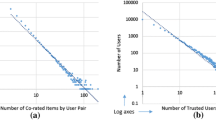Abstract
Collaborative recommender systems suggest items each user may like or find useful basing on the preferences of other like-minded individuals. Thus, the main concern in a collaborative recommendation is to identify the most suitable set of users to drive the selection of the items to be offered in each case. To distinguish relevant and reliable users from unreliable ones, trust and reputation models are being increasingly incorporated in these systems, by using network structures in which nodes represent users and edges represent trust statements. However, current approaches require the users to provide explicit data (about which other users they trust or not) to form such networks. In this chapter, we apply a semantic approach to automatically build implicit trust networks and, thereby, improve the recommendation results transparently to the users.
Access this chapter
Tax calculation will be finalised at checkout
Purchases are for personal use only
Preview
Unable to display preview. Download preview PDF.
Similar content being viewed by others
References
Adomavicius, G., Tuzhilin, A.: Towards the next generation of recommender systems: a survey of the state-of-the-art and possible extensions. IEEE Transactions on Knowledge and Data Engineering 17, 734–749 (2005)
Balabanovic, M., Shoham, Y.: Combining content-based and collaborative recommendation. Communications of the ACM 40(3), 1–9 (1997)
Burke, R.: Integrating knowledge-based and collaborative filtering in recommender systems. In: Proceedings of the Workshop on AI and Electronic Commerce, pp. 69–72 (1999)
Cornelis, C., Lu, J., Guo, X., Zhang, G.: One-and-only item recommendation with fuzzy logic techniques. Information Sciences 177(1), 4906–4921 (2007)
Good, N., Schafer, J.B., Konstan, J., Borchers, A., Sarwar, B., Herlocker, J., Riedl, J.: Combining collaborative filtering with personal agents for better recommendations. In: Proceedings of 16th International Conference on Artificial Intelligence, pp. 439–446 (1999)
Josang, A., Ismail, R., Boyd, C.: A survey of trust and reputation systems for online service provision. Decision Support Systems 43(2), 618–644 (2007)
Kwon, K., Cho, J., Park, Y.: Multidimensional credibility model for neighbor selection in collaborative recommendation. Expert Systems with Applications 36(2), 7114–7122 (2009)
Liu, D., Lai, C., Lee, W.: A hybrid of sequential rules and collaborative filtering for product recommendation. Information Sciences 179(20), 3505–3519 (2009)
Massa, P., Avesani, P.: Trust-Aware Collaborative Filtering for Recommender Systems. In: Meersman, R. (ed.) OTM 2004. LNCS, vol. 3290, pp. 492–508. Springer, Heidelberg (2004)
Montaner, M., Lopez, B., De la Rosa, J.: A taxonomy of recommender agents on the Internet. Artificial Intelligence Review 19(4), 285–330 (2003)
O’Donovan, J., Smyth, B.: Mining trust values from recommendation errors. International Journal on Artificial Intelligence Tools 15(6), 945–962 (2006)
Oufaida, H., Nouali, O.: Exploiting Semantic Web technologies for recommender systems: a multi view recommendation engine. In: Proceedings of 7th Workshop on Intelligent Techniques for Web Personalization and Recommender Systems, pp. 26–32 (2009)
Pazzani, M.J., Billsus, D.: Content-Based Recommendation Systems. In: Brusilovsky, P., Kobsa, A., Nejdl, W. (eds.) Adaptive Web 2007. LNCS, vol. 4321, pp. 325–341. Springer, Heidelberg (2007), citeseer.ist.psu.edu/resnik99semantic.html
Salter, J., Antonopoulos, N.: CinemaScreen recommender agent: combining collaborative and content-based filtering. IEEE Intelligent Systems 21(1), 35–41 (2006)
Su, J., Wang, B., Hsiao, C., Tseng, V.: Personalized rough-set-based recommendation by integrating multiple contents and collaborative information. Information Sciences 180(1), 113–131 (2010)
Victor, P., Cornelis, C., De Cock, M., Teredesai, A.M.: Key figure impact in trust-enhanced recommender systems. AI Communications 21(2–3), 127–143 (2008)
Wand, R., Kong, F.: Semantic-enhanced personalized recommender system. In: Proceedings of International Conference on Machine Learning and Cybernetics, pp. 4069–4074 (2007)
Zenebe, A., Norcio, A.: Representation, similarity measures and aggregation methods using fuzzy sets for content-based recommender systems. Fuzzy Sets and Systems 160(1), 76–94 (2009)
Zhang, Y., Chen, H., Jiang, X., Sheng, H., Zhou, L., Yu, T.: Content-based trust mechanism for e-commerce systems. In: Proceedings of the 3rd IEEE Asia-Pacific Services Computing Conference, pp. 1181–1186 (2008)
Ziegler, C.-N., Golbeck, J.: Investigating interactions of trust and interest similarity. Decision Support Systems 43(2), 460–475 (2007)
Ziegler, C.-N., Schmidt-Thieme, L., Lausen, G.: Exploiting Semantic Product Descriptions for Recommender Systems. In: 2nd ACM SIGIR Semantic Web and Information Retrieval Workshop, pp. 25–29 (2004)
Author information
Authors and Affiliations
Corresponding author
Rights and permissions
Copyright information
© 2012 Springer-Verlag Berlin Heidelberg
About this chapter
Cite this chapter
Martín-Vicente, M.I., Gil-Solla, A., Ramos-Cabrer, M. (2012). Implicit Trust Networks: A Semantic Approach to Improve Collaborative Recommendations. In: Recommender Systems for the Social Web. Intelligent Systems Reference Library, vol 32. Springer, Berlin, Heidelberg. https://doi.org/10.1007/978-3-642-25694-3_5
Download citation
DOI: https://doi.org/10.1007/978-3-642-25694-3_5
Published:
Publisher Name: Springer, Berlin, Heidelberg
Print ISBN: 978-3-642-25693-6
Online ISBN: 978-3-642-25694-3
eBook Packages: EngineeringEngineering (R0)




